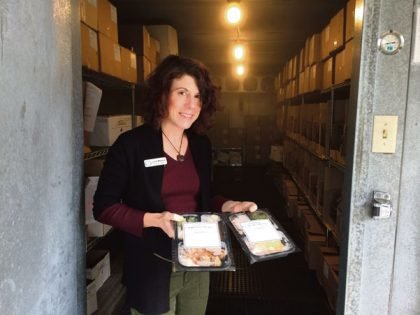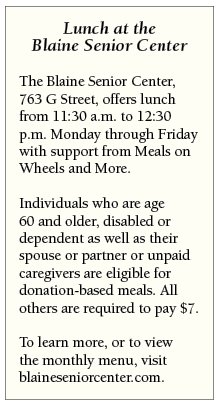 Meals on Wheels and More director Julie Meyers. Photo by Stefanie Donahue.
Meals on Wheels and More director Julie Meyers. Photo by Stefanie Donahue.
By Stefanie Donahue
The country’s senior population is growing and social service agencies are feeling the pressure.
According to the United States Census Bureau, the number of individuals age 65 and above grew from 35 million in 2000 to 49.2 million in 2016.
“The baby-boom generation is largely responsible for this trend,” said Peter Borsella, a demographer at the census bureau’s population division. “Baby boomers began turning 65 in 2011 and will continue to do so for many years to come.”
With the senior population projected to double by 2060, Bellingham-based Meals on Wheels and More is one of the many agencies grappling to maintain crucial social service programs with increasingly slim budgets.
Last year, Meals on Wheels and More provided 98,000 nutritional meals to 1,600 people age 60 and older in Whatcom and San
Juan counties.
 Courtesy photo.
Courtesy photo.
“The goal of our program is to help seniors maintain their health and independence,” said Julie Meyers, who has directed Meals on Wheels and More for the last six years. “A lot of times, we’re the first agency people turn to when they’re struggling with their day-to-day [routine].”
Meals on Wheels and More is a branch of Meals on Wheels America and is overseen by the Whatcom Council on Aging, a local nonprofit that operates the Bellingham Senior Activity Center, Whatcom senior tour program and other programs for seniors in Whatcom County.

Around a dozen paid staff members as well as volunteers make up the Meals on Wheels and More team. The program offers nutritious meals to individuals age 60 and older for a suggested donation of $4 to $5. People who are homebound due to illness or disability are eligible for frozen or hot meals delivered each week. Others can attend community meals at three locations in San Juan County and at nine locations in Whatcom County, including the Blaine Senior Center, Monday through Friday.
A nutritionist consults with homebound participants annually and oversees the contents of all meals, which typically contain some type of meat, v
egetable and fruit. In addition, the program also provides participants with valuable social connections, Meyers said. In Blaine, Birch Bay and Custer, the program currently serves 30 homebound participants; this year, they estimate to have served 80 homebound participants and delivered 10,500 meals in the area, she said.
Participation has “grown by leaps and bounds” in recent years, Meyers said. Between 2014 and 2016, the number of participants in Whatcom County who receive meals at their homes went up 36 percent – from 56,824 to 77,070 people. “We’re still growing,” she said.
The expanding senior population as well as an uptick in referrals from caregivers and social workers are the primary drivers for the increase in demand, Meyers said, adding that more healthcare professionals have realized that nutrition-focused programs help keep seniors healthy and out of the hospital. The demand, she said, brings financial strain.
Meyers said Meals on Wheels and More is running a budget deficit and will have to pull from Whatcom Council on Aging reserves to survive the next cycle.
 Courtesy photo.
Courtesy photo.
Last year, 35 percent of the program’s $1.2 million budget was paid for with federal grant funding under the Older Americans Act. Corporations, foundations, private donors, fundraising and local community centers (including the Blaine Senior Center) contributed 25 percent, clients contributed 24 percent, Whatcom County and the city of Bellingham contributed 8.5 percent and the Medicaid Waiver Program contributed 6.5 percent.
According to Meals on Wheels America, programs funded under the Act are serving 23 million fewer meals to seniors than in 2005.
To make up for the loss, Washington state lawmakers approved Senate Bill 5736 during the last legislative session to require the state Department of Social and Health Services to expand nutrition programs for the elderly; 25 percent of the expansion is dedicated to home delivery of meals to areas that aren’t served in the state. “It’s great that the state has stepped up,” Meyers said. “We don’t want to start a waiting list.”
Year-round, Meals on Wheels and More accepts volunteer assistance and monetary donations. To learn more, visit wccoa.org.
Comments
No comments on this item Please log in to comment by clicking here